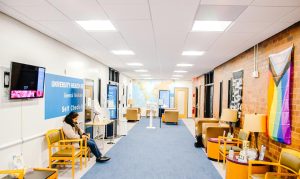Joiner Center Celebrates Twenty Years
October 31, 2002
As the William Joiner Center for the Study of War and Social Consequences celebrated their twentieth anniversary with a host of luminaries from the community, the possible war on Iraq loomed like a cold specter over the John F. Kennedy Library, where the event was held on Friday, October 25.
Kevin Bowen, director of the Joiner Center for the past 16 years, led the crowd in a moment of silence for Senator Paul Wellstone of Minnesota, who had died just hours before in a plane crash along with his wife, daughter, and several aides. Senator Wellstone was a “great, great loss to this company,” Bowen said.
After a moment of silence and prayer, Bowen continued. “I know you as friends, and co-workers, and people that it’s been a great pleasure and a privilege to work with as the Director of the Joiner Institute for the past sixteen years,” he said, addressing the large crowd that had gathered that night, “We often use the term Vietnam Veteran Community when we speak, and I think if you look around the room tonight, you’ll see what that community is, you’ll see it in the faces, in the faces that come from many parts of the globe and came together in that tragic war so far away come together again tonight as a community.”
“When the center was started, it was only seven years after the war and the consequences of the war were coming to society’s attention,” said Bowen. “Bill Joiner Jr. was one of the first waves ofpost-war casualties, died of an illness related to the war, and left behind a wife, two children, who are with us tonight. In our gathering tonight, we pay tribute to him, to all those who suffered from the war, to pay tribute to all those who have committed their lives to alleviating that suffering that continues long after the war is supposedly over.” Bowen went on to thank a number of people for their hard work, among them, founder Paul Atwood, T. Michael Sullivan of the Center’s writer’s workshops, and co-chair Marshall Carter.
It was Marshall Carter who suggested Jonathan Schell for Master of Ceremonies for the event, saying that there are few writers who wrote about the war from the inside. Schell has written for The Nation in the form of “Letters From Ground Zero,” contributed to The New Yorker, and written several books, most notably, “The Fate of The Earth” and “The Unfinished Century.”
In his remarks, Schell eloquently described war as “the widow of a lifetime of grief, the child with no memories of father.” War is the homeless veteran, he said. “And after the shooting has stopped and the cameras have gone away and the cause is won or lost, the real war begins. And that war too, must be fought. Not on a tour of duty, but over a lifetime. And that’s where the Joiner Center comes in.”
Schell also felt that he needed to comment on the possible war on Iraq. “I could not stand up at a public occasion devoted to the subject of war, without telling you of my deep opposition to the war that we are about to intervene in,” he said, before thunderous applause filled the room for several minutes.
And even though there may be many differences in opinion on the war in the room, said Schell, there was at least one thing everybody could agree on, “If there is a war, as we all hope there will not be, someone is going to have to deal with it when it’s over, and that’s again where the Joiner Center comes in.”
Chancellor Jo Ann Gora also made her remarks, saying that the Joiner Center “promoted cultural exchange and understanding for twenty years. It has not only studied history, it has shaped history.”
“Every year the university gets letters, The Boston Globe gets letters,and everybody gets letters from the folks who think this isn’t a good idea, but we know it is a good idea because what the Joiner Center is doing is promoting cultural understanding, and that’s what we all need in order to reduce the likelihood of conflict in the future. So, we are so happy to be supportive of the Joiner Center, because it has promoted these cultural exchanges for many years, it has promoted translation projects, which have enabled us to understand the feelings and the hearts and the minds of these writers.”
Chancellor Gora also mentioned the Center’s study of Post-Traumatic Stress Disorder, saying, “They have worked so hard to help both Americans and Vietnamese come to grips with the consequences of war and to promote the cultural understanding that will prevent tragic consequences in the future,” she said, and thanked everybody who showed up in support of the Center.
Finally, keynote speaker Senator John F. Kerry took the podium, and asked for a moment of silence for his fellow senator Paul Wellstone, and Wellstone’s wife and children and campaign aides. While not a veteran, Wellstone was “a champion of veterans”, and a public servant of the “downtrodden, disenfranchised.”
After the moment of silence, Senator Kerry went on to call the Joiner Center “a remarkable gift back to the country that comes out of the sorrow and tragedy of war.”
Fresh off the campaign trails in Michigan, Missouri, Minnesota, and Florida, Senator Kerry asked, “How can I come here to be at the Joiner Center’s celebration of twenty years, on the eve of a potential war, and say nothing about it? I can’t. That would be inappropriate and it would do a disservice to the institution set up to study war and social consequences. So let me just share with you where this United States Senator is coming from.”
Senator Kerry sought to justify his vote in favor of President Bush’s Iraq resolution weeks before. “For seven years, we had a team in [Iraq], inspecting those weapons of mass destruction. And we found, in the course of those inspections, far more weapons that we then destroyed than we found in the course of the war itself. And we found that he was closer to having a nuclear weapon than we had ever presumed.”
Kerry continued, “and indeed, we have spent a billion of your tax dollars each year to patrol no-fly zones, to enforce the terms of the cease-fire agreement, which he signed not just with the United States of America, but with the U.N., with the world.” Neglecting the fact that it was the United States who pulled the team of inspectors out, Senator Kerry stated that in 1998, it was Hussein who kicked them out.
When Senator Kerry mentioned Hussein’s weapons of mass destruction, a heckler yelled out from the audience, saying, “That we gave him! That we provided him!”
“You’re absolutely right,” said Sen. Kerry, directly addressing the speaker. “We were responsible for giving him some of–not the nuclear secrets–but the biological secrets in the course of the war against Iran.”
The man continued to heckle Sen. Kerry as he spoke, and was eventually shushed by the rest of the crowd. Senator Kerry went on to call Hussein “a master of miscalculation,” and called the Hussein government the “most Stalinistic regime in the world today.”
Senator Kerry said that a country does not go to war as a first instance, but as a last instance because of concerns to the country, after an exhaustion of remedies. He said he does not support the doctrine of pre-emption, and that unilateralism is a catastrophic mistake which he and other senators would oppose.
Turning back to the Joiner Center, Sen. Kerry said, “Almost every single good thing that has come to this generation of veterans, including the ones that follows us, has come because of the efforts of the Joiner Center and others who’ve joined in that battle.” And it is veterans, he continued, who have produced for veterans in advances in education, the recognition of Agent Orange, Post-Vietnam Stress Syndrome, the extension of the G.I. Bill. “All of those things came through the efforts of veterans keeping faith in veterans,” he said to a round of applause.
Among those the Joiner Center recognized for their work: Dr. Ernesto Gonzalez, who served in Vietnam in 1967 as a battalion surgeon and “a compassionate advocate for the poor and homeless,” according to Thomas Hudner, Jr., a Medal of Honor recipient.
Charles F. Desmond, a co-founder and chairman of Joiner Center, holds a doctorate in education from UMass Amherst. Robert O. Muller, the president and founder of the Washington DC-based Vietnam Veterans of America Foundation, co-founded the Nuclear Threat Reduction Campaign and the Campaign for Criminal Justice Reform. Sheila Spicer, a Team Leader and Clinical Coordinator at the Vet Center, is also partof a research team for the National Vietnam Veterans Readjustment Society, continuing research conferences on “The Issues and Concerns of Women in the Military.”
The night came to a close with a folk song sung by Thanh Nguyen, and the reading of several poems by Vietnamese soldiers in English, then afterwards sang those poems in their native tongue.











































































